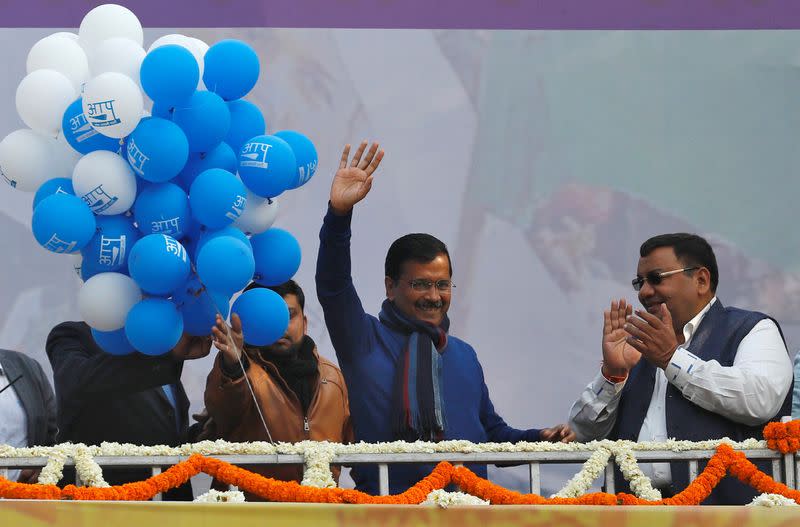Arvind Kejriwal: the prominent Indian anti-corruption crusader arrested for graft

By Rupam Jain and Shivam Patel
NEW DELHI (Reuters) - Arvind Kejriwal founded one of India's newest parties more than a decade ago on an anti-corruption platform and took it to national prominence in no time, irking Prime Minister Narendra Modi's party as well as the main opposition Congress.
Kejriwal, chief minister of the territory of Delhi whose Aam Aadmi Party (AAP) also runs Punjab state, was arrested on Thursday night by the financial crime-fighting agency for alleged corruption in awarding liquor licences. His party has dismissed the allegations as "a desperate attempt to malign the image" of Kejriwal.
The arrest potentially takes one of the opposition alliance's biggest campaigners out of action ahead of the general elections to be held from April to June, when Modi's Bharatiya Janata Party (BJP) is widely expected to win a rare third straight term.
Kejriwal, 55, earlier ignored multiple summons from the Enforcement Directorate that investigates money laundering. Three of his senior party colleagues are already in jail waiting trial in the liquor case. But Kejriwal, who is in Enforcement Directorate custody, has repeatedly told election rallies in recent months that if he was corrupt "then there is no one in this world who is honest".
Modi and his BJP colleagues have said the government has given a free hand to investigating agencies like the Enforcement Directorate to act against corruption as per the law. Modi's office did not respond to questions about opposition allegations that agencies were targeting them unfairly.
"It's evident that the Modi government is determined to hurt our leader as he exposes flaws in Modi's politics and policies," Punjab Chief Minister Bhagwant Mann and Kejriwal ally told Reuters.
Kejriwal is a former senior tax official who won the Ramon Magsaysay Award, often called Asia's Nobel Prize, in 2006 for leading a right-to-information movement and helping the poor fight corruption.
Dressed mostly in simple loose shirts and trousers in keeping with his image of the champion of the poor, Kejriwal drew support mainly from rickshaw drivers, labourers and women in slums of Delhi when he launched his party, named after the "common person", in 2012.
His efforts to expand the party in other states has achieved mixed results. In 2014 he lost badly to Modi in the parliamentary constituency of Varanasi, an ancient Hindu holy city in the country's most populous state of Uttar Pradesh. The state sends the most number of lawmakers to parliament.
The party's focus on healthcare, schools and subsidies on power and water bills - benefiting the poor the most - has gained traction in Delhi, Punjab and some parts of Gujarat, Modi's home state.
Kejriwal said in February that his party, and not the century-old Congress, was the main challenger to the BJP, especially for the 2029 election. National opinion polls, however, still predict Congress will be the second biggest party in the upcoming election.
Keen to present a united front, most opposition parties including Congress have rallied behind Kejriwal.
Congress allied with Kejriwal's party for this election but they have been hitting out at each other since 2013, when Kejriwal defeated Congress stalwart Sheila Dixit to become Delhi chief minister.
On Thursday, Dixit's son Sandeep was among Congress politicians who addressed the media outside Kejriwal's house condemning his arrest.
Political analysts said the arrest could help galvanise Kejriwal's party and the opposition. Kejriwal is yet to be formally charged by the Enforcement Directorate but others arrested by it, including his party colleagues, struggled to get bail for months after their arrests.
"The arrest may not eclipse his political career as he has the potential to turn this negative development in his favour," said A.K. Verma, director of the think tank Centre for the Study of Society and Politics.
(Editing by Krishna N. Das and Frances Kerry)

 Yahoo News
Yahoo News 
